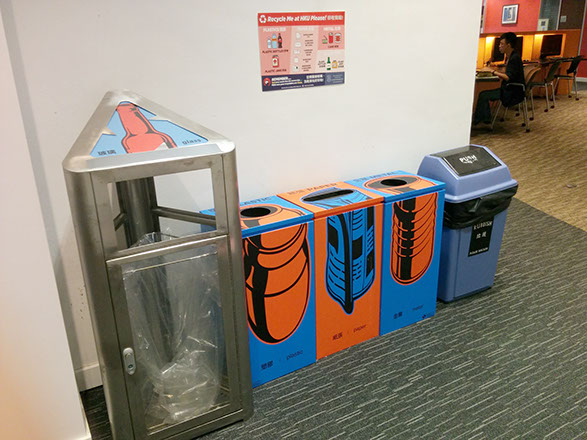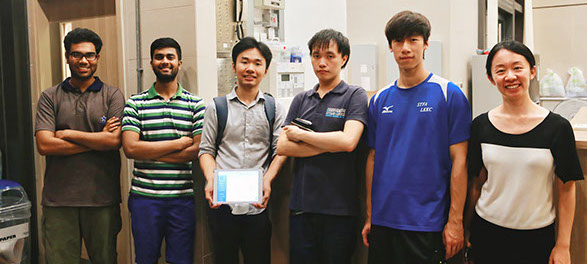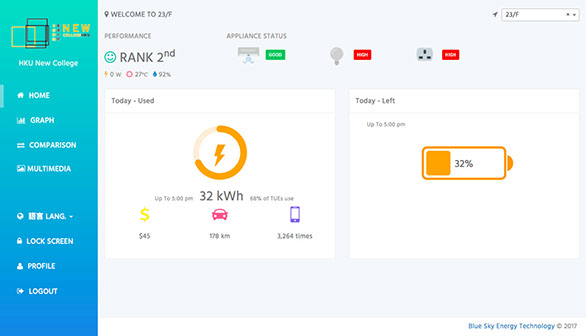The University’s sustainability aims are set down in the planning document, Asia’s Global University, The Next Decade, Our Vision for 2016–2025, which states: “The principles of sustainability will guide our planning and development at every level.”
Plastics are front and centre in the environmental battle right now – with headlines almost daily of sea birds, fish and mammals killed by consuming plastic waste in the ocean. HKU has taken up arms against plastic and other disposable waste with a project called Ditch Disposable, which encourages stakeholders across the University to commit to reducing their waste through a combination of policies and behavioural change.
The first phase of Ditch Disposable focusses on single-use plastic bottles and includes a new policy on disposable plastic bottles, the first such policy in the city’s higher education sector. With effect from July 1, 2017, the sale of water in disposable plastic bottles of one litre or less in volume has not been permitted in catering outlets, retail locations, or vending machines owned by or located on university premises. Nor can they be distributed at any activities or events. “The University community has been really supportive, and we look forward to expanding the effort to include a wider range of single-use disposable goods,” said Ms Ann Kildahl, HKU’s Sustainability Manager. “We are also working with our colleagues in the Estates Office to increase the availability of free, filtered water on campus.”
A student-focussed, carbon reduction project called Smart Meter, Smart Energy was launched in 2015 through a pilot scheme on four floors of New College. Said Assistant Sustainability Manager Joy Lam: “Through the use of smart meters and a real-time data dashboard, teams of student leaders have been trained to innovate, develop and implement data-driven solutions on-site that reduced energy consumption by over 25 per cent.” The initiative is the first of its kind in Hong Kong and was highlighted as an outstanding demonstration project by Hong Kong Government officials at the 2015 United Nations Climate Change Conference in Paris.
“Expansion of the scheme across four residential colleges in the coming year will enable 1,800 students from more than 50 countries to participate, with experiential learning programmes open to all HKU students,” said Ms Lam. In addition to the project’s environmental benefits, “this is an exciting opportunity for the University to demonstrate leadership in the community, pioneering smart building operations and outreach efforts as a ‘living laboratory’ for sustainability and low-carbon living,” she said.
Sustainable funding
A new financing mechanism – the Green Revolving Fund (GRF) – has also been adopted, the first of its kind among universities in Asia. In cooperation with the University’s Estates and Finance and Enterprises Offices, the GRF treats energy-efficiency upgrades as investments rather than costs and enables HKU to reduce its environmental impact in a financially sustainable manner.
“In short,” explained Ms Kildahl, “the installation of more energy-efficient equipment drives reductions in utility and maintenance bills, allowing the money saved to be returned to the fund and invested in additional equipment upgrades.” Initial funding of approximately HK$1 million was allocated in a pilot phase to finance two lighting projects in the Kadoorie Biological Sciences Building and the Li Ka Shing Faculty of Medicine.
Engagement in sustainability work also extends to outside collaborations. “HKU is participating in a number of networks locally and globally where universities are working together to improve their capacity to address sustainability challenges,” said Ms Kildahl. “Across the University, locally and overseas, people are working to realise our institutional vision to integrate principles of sustainability into all aspects of our facilities, operations and activities.”
The potential benefits go beyond energy savings. Among tertiary institutions worldwide, GRFs have a track record of generating positive financial returns and can significantly outperform conventional endowment investment returns. In addition, the GRF can be used to support a wide range of projects on campus, encouraging participation and promoting awareness of environmental issues across the University.
“As a leading higher education institution in the region, HKU has many opportunities to develop solutions to pressing problems and make a positive contribution to our community,”
Ms Kildahl said. Other projects that demonstrate this leadership include the Green Connections film and speaker series, which aim to get members from all parts of the University community involved with sustainability issues. The programme looks at all aspects of sustainability; topics this year have spanned from fast fashion, to conservation, to soil science. HKU also works with the Environmental Protection Department to manage the Lung Fu Shan Environmental Education Centre, which is open to the public to explore sustainable living and the environment of the area through guided tours, workshops and other activities.
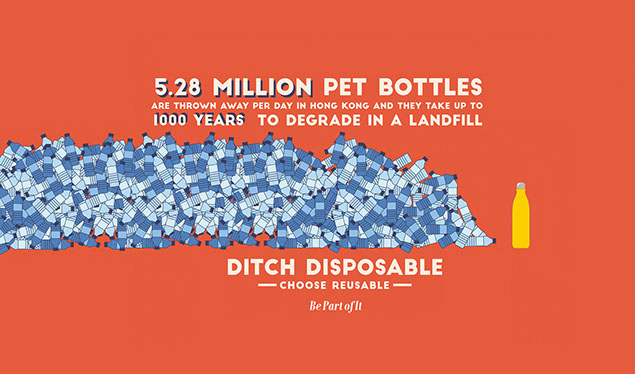
Sustainable
Plan Of Action
HKU has renewed its long-standing commitment to sustainability by introducing a series of initiatives that will bring about meaningful change on campus and will involve faculty, staff and students.
The kick-off ceremony of the Ditch Disposable campaign was held on campus on March 22, World Water Day.
36 sets of new recycling bins, designed by Hong Kong artist Tommy Li, have been installed across the Main and Centennial Campus to make recycling even easier. Lightbulbs and batteries can also be recycled in specific bins around campus.
This summer, student teams are optimising lighting in a residential college room.
The installation of smart meters in student rooms and a real-time data dashboard can benchmark the consumption levels and prompt the residents to take action.
The Lung Fu Shan Environmental Education Centre is located next to the HKU campus. The Sustainability Office organised an eco-tour for HKU staff and students earlier this year into the Lung Fu Shan Country Park.
HKU has introduced Ditch Disposable, a University-wide waste reduction and awareness campaign that aims to eliminate disposable plastic water bottles from the University campus.
Back
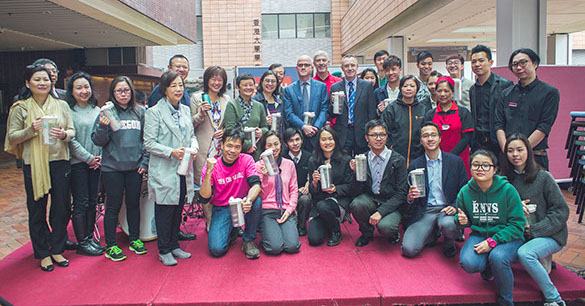
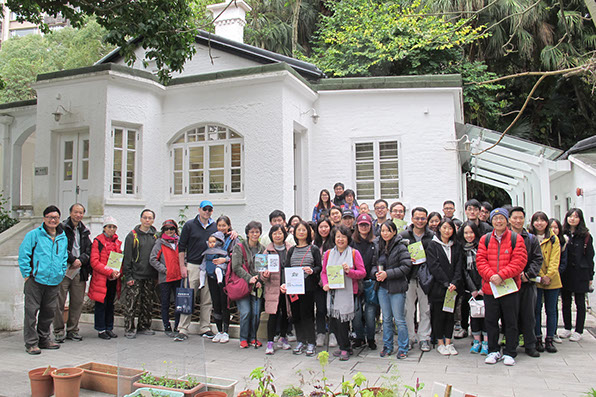
![]() The principles of sustainability will guide our planning and development at every level.
The principles of sustainability will guide our planning and development at every level. ![]()
HKU’s 2016–2025 Strategic Plan
